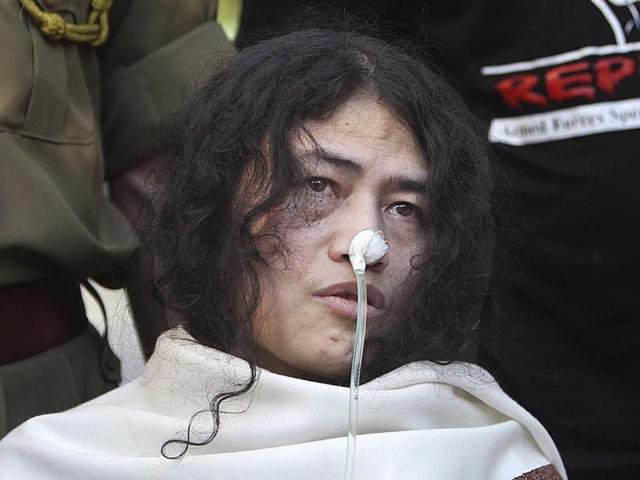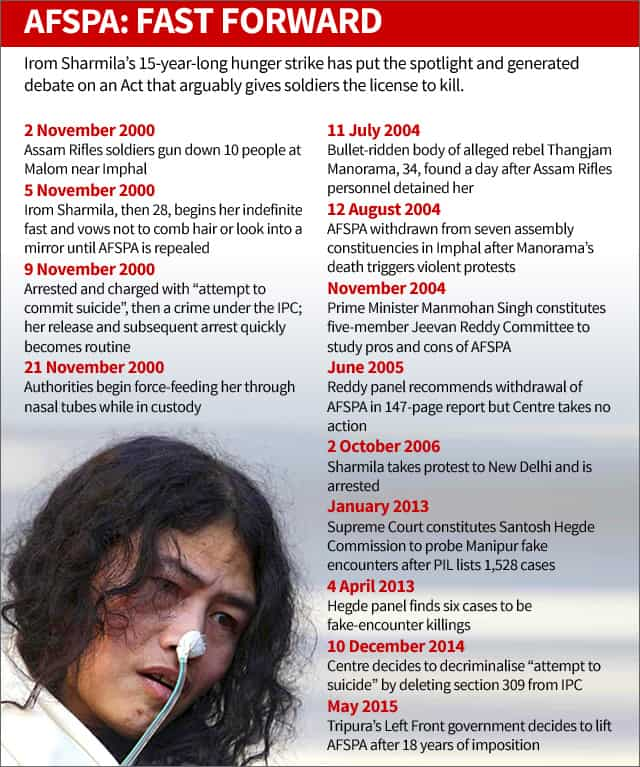Court seeks AFSPA in Meghalaya as Sharmila clocks 15 years of fasting
On Wednesday, Irom Sharmila conveyed a crisp message after completing 15 years of her indefinite fast against the Armed Forces (Special Powers) Act that allegedly gives soldiers the licence to kill at will. It read: “I will carry on until my mission is accomplished.”
On Wednesday, Irom Sharmila conveyed a crisp message after completing 15 years of her indefinite fast against the Armed Forces (Special Powers) Act that allegedly gives soldiers the licence to kill at will. It read: “I will carry on until my mission is accomplished.”

But the call for repealing the controversial AFSPA from the northeast – specifically Manipur – was somewhat muffled by the Meghalaya high court’s directive to New Delhi earlier this week for imposition of the legislation in the troubled Garo Hills region of the state.
Noting the unending cycle of violence, extortion, kidnapping and shutdowns by myriad militant outfits, the court said there was no alternative to AFSPA for restoring law and order in the Garo Hills area bordering Bangladesh.
The 43-year-old Sharmila, known as the Iron Lady of Manipur, has lived only on liquids force-fed by doctors since she began her protest against the contentious legislation on November 5, 2000.
Human rights organisations that have rallied behind Sharmila to highlight AFSPA-induced fake encounters, said the act was no solution to ensuring peace. They cited the example of Tripura, which last May decided to withdraw AFSPA from the state.
Security officials, however, said Tripura’s decision was an outcome of the peace 18 years of life under AFSPA brought. Conflict experts, on the other hand, felt the act really did not matter since most encounters are by the state police forces that do not come under the purview of AFSPA.

The act, enacted in 1958 and in force in a few states in the northeast and Jammu and Kashmir, grants special powers to the armed forces, the most controversial being the legal immunity it provides to army officers. The law also gives special powers for detaining, using lethal force and entering and searching premises without warrant.
“Sharmila’s struggle hasn’t been in vain, though things have moved painfully slowly,” Babloo Loitongbam, executive director of Imphal-based Human Rights Alert, said.
One of the outcomes was the lifting of AFSPA in August 2004 from seven assembly constituencies of Imphal, a move partly prompted by violent protests following the death of a suspected rebel Thangjam Manorama, 34, whose bullet-ridden body was found a day after Assam Rifles personnel picked her up.
“Sharmila is the silent voice of people in Manipur and other areas of India affected by this draconian act. She has been on hunger strike for the longest duration anywhere on earth, but we are looking beyond record to urge the Centre to probe all cases of extrajudicial execution and repeal AFSPA so that Sharmila can lead a normal life,” said Sobita Mangsatabam of Women Action for Development.
She added that rights groups across India organised special meetings and rallies on Wednesday to express solidarity with Sharmila.
Read More:
Sharmila is not allowed to die because her Santhara is political
Security agencies to take call on AFSPA: Jitendra Singh
J-K govt to revoke Afspa after taking army on board: CM Mufti





